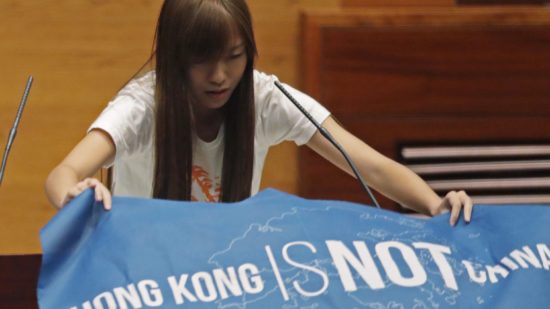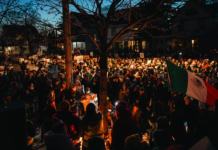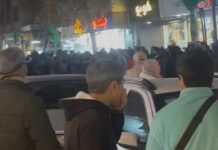“Nothing short of a coup” says Labour Party lawmaker
Dikang, Socialist Action (CWI in Hong Kong)
The ‘legal’ ruling on 7 November by the Standing Committee of Beijing’s fake parliament, the National People’s Congress (NPC), over the oath-taking controversy in Hong Kong’s Legislative Council (LegCo), has opened the way to a far-reaching establishment assault on the elected opposition members of the LegCo and democratic rights in general. The establishment camp and Chief Executive ‘CY’ Leung Chun-ying hypocritically claim to be ‘defending’ the LegCo rules and the ‘solemnity’ of its oath of office, when in fact they are using undemocratic means to change the results of an election that went against them.
Should this succeed it would overturn the results of the September elections, invalidating hundreds of thousands of votes, and reduce the LegCo to a pale copy of the unelected NPC. Furthermore, the government clearly views this purge as a launchpad for implementing Article 23 national security legislation which if passed would outlaw many forms of protest and make opposition to the CCP (Chinese Communist Party) regime “treasonable”.
Labour Party legislator Fernando Cheung Chiu-hung described this as “nothing short of a coup, except that it is initiated by the people in power.”
These developments represent a new and ominous stage in the Chinese dictatorship’s push to dismantle Hong Kong’s partial democratic rights, won through mass pressure and struggle.
Ostensibly, the NPCSC (National People’s Congress Standing Committee) delivered its ‘interpretation’ of Hong Kong’s Basic Law section 104, to rule on the disputed oaths of two newly elected lawmakers from the racist localist group, Youngspiration. Socialist magazine opposes the racist anti-mainlander rhetoric of Youngspiration and their neo-liberal economic programme. But their oath-taking theatrics have been massively overblown by the establishment as a pretext for a wider assault against not just ‘separatism’, i.e. the localist movement, but against the entire opposition and democracy movement. This is about more than the LegCo; it is a pre-emptive strike against future mass protests on the lines of the 2014 Umbrella Movement, which could escalate into a revolutionary challenge to the government.
Beijing’s view
The Chinese dictatorship is in the throes of a sharp power struggle, with Xi Jinping’s coronation last month as “core” leader telling us at least two things: that Xi is still pushing for more personal power in order to control leadership changes that take place next year, and that Xi and the central leadership are still encountering at least passive resistance and non-compliance from within the state, especially from local governments.
In the matter of Hong Kong, the central government’s policies have always been determined mostly by the need to contain its effects on the rest of China. In recent years, Beijing’s overriding concern has been to clamp down on Hong Kong’s democracy struggle for fear that it could ‘infect’ China.
This has led the regime into an upcycle of repression culminating this year in the kidnappings of Hong Kong booksellers and now the ban on so-called ‘separatists’ from entering the LegCo. As the Washington Post declared in an editorial (8 November, 2016), “China’s governance of Hong Kong is a series of object lessons in the self-defeating consequences of repression.” But Beijing does not see it this way. In its eyes, the problems associated with governing 1.3 billion potentially unruly subjects take precedence.
The regime’s fear of revolution, which explains Xi’s unprecedented concentration of personal power, also explains why, even by comparison with former leaders of the dictatorship such as Deng Xiaoping and Jiang Zemin, Beijing’s handling of Hong Kong issues today is at first sight inexplicably inflexible and ham-fisted. The latest NPC intervention is a prime example.
At this stage it is not clear if Xi Jinping’s regime wants a more comprehensive crackdown in Hong Kong or, as is more likely, merely to “nip the forces of separatism in the bud”. But this shows the contradictions of China’s political system where, despite the appearance of a strong centralised state, orders from Beijing get distorted and modified to suit the interests of economically significant local elites. The undemocratic exclusion of localist candidates will increase rather than reduce support for independence in Hong Kong. But Beijing’s main focus is how this message plays inside China – to show it is firm against “foreign-backed plots to split China”.
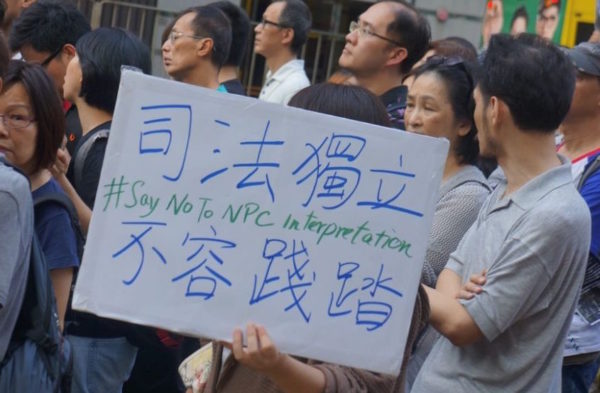
CY’s agenda
In Hong Kong’s case a besieged ruler, CY Leung, is partly exploiting Beijing’s need to show firmness to pursue his own agenda, which is to stay in power for another five years. He hopes to make it more difficult for Beijing to endorse a rival candidate in the upcoming ‘election’ of Chief Executive, by creating conditions in which the need for a ‘united front’ in the establishment camp trumps the pressure to get rid of a disastrous leader.
Further complicating matters for the central government, the NPC is under the control of its chairman Zhang Dejiang, ranked third in China’s power structure, who like CY Leung is connected to the ‘Jiang Zemin faction’ of the CCP. Since coming to power, Xi Jinping has sought to curb the power of this and other factions to secure fuller control over the reins of power. It is not unrealistic to assume this faction has an interest in inflaming the current Hong Kong crisis, if that helps CY Leung to keep his job and also to outshine Xi’s faction as “resolute defenders” of the Chinese nation. But it would be a mistake, as some commentators do, to read too much into this, and especially to place any hope in the central government to respect democratc rights in Hong Kong. Divisions undoubtedly exist between the CCP factions, but far from opposing a crackdown the differences are really only about how far to go and at what speed.
Whether or not this was fully intentional, the NPCSC intervention has given legal and political ammunition to CY Leung and the maddest of the mad dogs within Hong Kong’s pro-Beijing camp. These layers want to escalate the crisis and launch a wider purge, targeting up to 15 legislators – half the opposition ranks in the LegCo. The wording of the NPCSC ruling offers an extremely wide list of transgressions by which legislators, even retroactively, can have their oaths invalidated as insufficiently “sincere, solemn, accurate and complete” leading to their ejection from the LegCo. Even “pausing for too long” when reading the oath counts as a violation according to the NPCSC ruling. ‘Long Hair’ Leung Kwok-hung of the League of Social Democrats (LSD) is now threatened because he held a yellow umbrella while reading the oath – the NPCSC lists the use of “props” as a violation.
The NPCSC says that advocating independence and self-determination, which both mean the same thing according to the CCP, is illegal and legislators “bear legal responsibility” for any such statements. This represents a massive attack on the right to free speech, underlining the fact that the establishment’s offensive goes way beyond the question of the two localists’ seats in LegCo. Speaking on Xinhua Television (14 November 2016), CY Leung said independence advocates “cannot exist in the political system” and the topic cannot be discussed in schools. Again he emphasised that transgressors will be dealt with “in accordance with the law.”
Establishment offensive
Within days of the NPCSC intervention, two ‘blue ribbon’ (pro-Beijing) activists filed separately for a judicial review against eight and eleven opposition lawmakers respectively. This is clearly an orchestrated plan. Equally predictably, on 13 November, ‘blue ribbon’ groups mobilised – and probably paid – 30,000 to attend a demonstration opposing ‘separatism’ and defending the NPCSC ruling.
There are clearly splits within the pro-Beijing camp about how far to go down this road, with some sections fearful that a wider purge could provoke a powerful political backlash. They are urging ‘restraint’ and want to limit the purge to the two Youngspiration politicians.
A legal debate is also raging about whether the NPCSC has ‘overreached’ its powers under the dictatorship’s own constitution. Its ruling clearly goes beyond an ‘interpretation’ of the Basic Law by effectively amending the relevant ordnance of the LegCo in respect of oaths, which means it has changed a piece of local legislation, something it is not empowered to do under the ‘one country, two systems’ formula. The legal implications should the Hong Kong courts reach a different judgement in any of the ‘oath-taking’ cases are also unclear.
But constitutional arguments and legal hair-splitting over the provisions in the Basic Law will not stop this attack. Mass resistance is the only sure way to do that. To paraphrase the great revolutionary Leon Trotsky, who knew a thing or two about fighting dictatorship, when faced with such an attack questions of legal defence should occupy only one percent of our energies, 99 percent should be devoted to developing a bold political counterattack.
![Pro-Beijing ‘blue ribbon’ supporters demand tough measures against ‘separatists’. [Photo: D Garr]](https://media.chinaworker.info/2016/11/Protests-Blue-2-600x400.jpg)
CY Leung is fighting to overcome massive hostility to his rule, not only among the population at large, but also, and crucially, among large sections of the capitalist elite which views him as a liability. A recent opinion poll in Ming Pao newspaper placed CY last among five possible candidates, even though the other four have not yet formally announced they will run.
Sections of the elite – and only the elite can vote in the March election – are waging an unofficial “Anyone But CY” campaign to persuade Beijing to endorse a less divisive figure as his replacement. The traditional Hong Kong tycoon class and layers of the British-groomed bureaucracy have chafed at some of CY’s economic policies, which have allowed mainland ‘red capitalists’ to encroach on the former monopoly positions of the local capitalists.
This wing of the capitalist establishment also holds CY responsible for the political turmoil and radicalisation of recent years, including the Umbrella Movement and the explosion of pro-independence sentiment in its aftermath. The crystallisation of a Hong Kong ‘national’ consciousness, fuelled by Beijing’s increasingly repressive rule, has allowed the city’s localist groups to gain support.
Yet none of the localist groups, which are based on right-wing nationalism and racism, offer any strategy or even a coherent definition of what ‘self-determination’ means. Their ‘struggle’ consists mainly of yelling slogans and racist abuse but little else, as the Youngspiration duo amply demonstrated when taking their oaths. These antics have played into the hands of the Chinese dictatorship and CY Leung. Many Hong Kong people suspect localist groups like Youngspiration have been infiltrated or even nurtured by the establishment, precisely to provide a pretext for a counter-revolutionary push back.
The localists’ first crisis
The LegCo oaths crisis has highlighted the enormous weaknesses and divisions in the localist camp. It is their first real test and they have scored badly. These diverse groups have been raised to prominence by a powerful mood in society, of massive discontent, which in the absence of a genuine fighting and democratic alternative has gravitated around localism. This followed Beijing’s categorical refusal in 2014 to allow democratic elections and the subsequent stalemate of the Umbrella protests.
The localists thrive on making political attacks against other groups, especially online, sometimes making correct points about the timidity and lack of fight of the traditional pan-democratic parties. But they themselves have not built or organised anything worthy of mention. During the Umbrella Movement they called for “militant actions” but without any political demands of their own or any ambition to challenge for the leadership of the struggle.
The activists who later formed Youngspiration played almost no part in the Umbrella protests. One of the two facing expulsion from the LegCo, Yau Wai-ching, admits she never even set foot in the occupations. The latest crisis, with two of their three elected positions under the axe, finds the localists deeply split and in a state of near paralysis. Ignominiously, they needed the pan-democrats and ‘left idiots’ they so despise to organise protests to defend their positions.
The crisis has exposed the localists as ‘paper tigers’. After all, if they cannot mobilise people to defend their elected positions, which the government intends to make sure they will never recapture, how can they lead a struggle to defeat the CCP and win independence? Yau announced she has written a letter to the British government asking them to intervene – a letter to Santa Claus might have more effect!
Still, while it is in the nature of the loose localist parties and groups to suffer splits and crises, the national question will not disappear in Hong Kong. On the contrary, the establishment’s increasing resort to repression ensures that support for independence will rise and, in a political vacuum, it is fully possible for localism as a trend to make gains despite its current setbacks. The creation of a workers’ party with a fighting left programme could cut across the growth of localism, especially if it stood on a clear programme for self-determination for all national minorities as part of a united struggle to defeat capitalism and dictatorship.
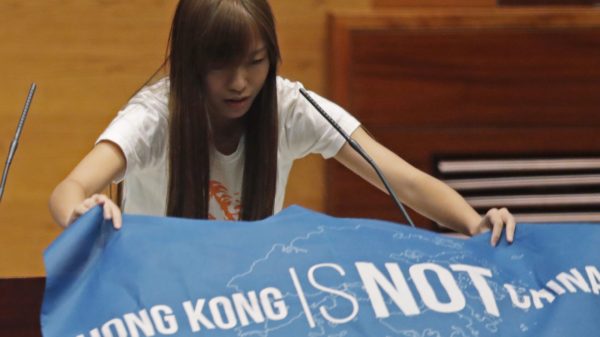
A wider attack
The election saw the localists catapulted into the LegCo for the first time, with 11.1 percent of the citywide vote and three seats. Three other new faces standing on a platform of ‘democratic self-determination’ but distancing themselves from the localists and their anti-mainlander racism, were elected with 7.8 percent of the vote. The LSD and People Power, two older groups that are more radical than the mainstream pan-democrats, received 7.2 percent of the vote and two seats.
It is these eight representatives of diverse ‘radical’ political forces, which collected over a quarter (26.1 percent) of the votes cast in September, that are the main targets should a wider purge unfold. The loss of just four seats would rob the pan-democratic opposition of the voting numbers to stop the government pushing through anti-democratic rule changes such as abolishing the filibuster. This is a tactic that has been used extensively to check the government’s power for example over obscenely wasteful ‘white elephant’ projects which consume the bulk of budget spending. The filibuster has been the target of a hysterical hate campaign by pro-Beijing parties and business lobbies.
The rules for subsequent by-elections could also be further tampered with, adding new restrictions to screen out anti-government candidates. These threats, and the parallel campaign to subordinate Hong Kong’s ‘independent’ judicial system to open political control, have been significantly boosted by the NPCSC ruling. Carried to its conclusion the purge means extending the ‘831’ ruling of 2014, for a fake, vetted election system for Chief Executive, onto future LegCo elections.
“This amounts to China directly handpicking legislative candidates,” said Lee Cheuk-yan, who is General Secretary of the Hong Kong Confederation of Trade Unions. “It might be that, even the act of merely calling for ending one-party rule in China or opposing the Chinese Communist Party could well be found as out of line,” he told Time magazine (10 November 2016).
How to fight back?
It is not certain that the purge which has begun with the expulsion of the Youngspiration duo, will develop into such a full-blown crackdown. But more than anything that depends on mass pressure, above all organised resistance on the streets, in the schools and in the workplaces. The worst excuse for a ‘strategy’ would be to adopt a wait-and-see attitude, holding back until the law courts have dealt with the many oath-related cases brought about by the ‘blue ribbons’. Unfortunately, so far, this is exactly the response of the pan-democratic leaders, after an initial demonstration on 6 November.
One factor is the moderate pan-democrats’ fear that demonstrations can become a launching platform for localist youths to confront the police, resulting in clashes as occurred on 6 November. But this shows the need for an organised and disciplined mass movement, with democratically agreed tactics and stewards. It is not an excuse for cancelling protests altogether! An even more serious problem is that the pan-democratic leaders with their one-sided focus on electoral politics are reluctant to protest too strenuously fearing the witch-hunt could widen to target their own seats. Some sections of the pan-democratic establishment would privately be happy with a ‘trade-off’ that allows them to win by-election seats vacated by deposed localists or ‘radicals’.
Instead, a conference of all groups who oppose the purge should be convened to discuss not only new demonstrations, but a strategy for student and workers’ strikes and other forms of mass resistance. It is again noteworthy that the localists, who have taken control of most university student unions, have done nothing to agitate for student strikes or even campus protests on this issue. The previous pan-democratic-linked leadership of the Federation of Students at least called for strikes in 2014, even if in our opinion this call was issued too late and insufficiently prepared.
Socialists oppose the attacks on the LegCo and the establishment’s increasing political control of the judiciary. These institutions are instruments of capitalist rule and in our opinion only very indirectly reflect the democratic pressure of the masses. But the government’s current offensive seeks to further reduce mass influence upon these organs of the bourgeois state and integrate them more tightly into an authoritarian system as exists in mainland China.
Therefore we stand for the defence of every elected seat in the LegCo, opposing the right of the government, the courts, or the Chinese dictatorship, to overturn the election results or impose censorship on the LegCo. We reject the idea that the judiciary or the Basic Law, neither of which are subject to any democratic controls, stand above the votes of Hong Kong people cast in the elections. While the LegCo is a largely toothless rubber-stamp legislature, the elected ‘geographical’ seats represent an important platform within this corrupted institution for the masses, above all for the working class, to intrude upon and expose the political shenanigans of the ruling elite and to issue appeals for mass struggle. It is this right, to elect representatives freely, without government vetting or censorship, that is under attack.
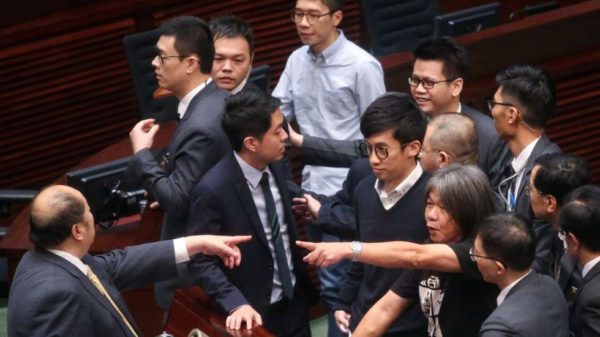
Socialists and the democracy struggle
Socialists fight for every democratic advance and to defend previous achievements, but this does not mean we defend the status quo, which is far from a democratic system. A mass movement in defence of existing democratic rights needs a programme to extend these rights – for full democracy. This means the immediate abolition of undemocratic structures such as the functional constituencies and small-circle selection committee.
The LegCo, which is only partly elected, should be replaced by a genuine and democratic People’s Assembly, based on full universal suffrage, with the voting age reduced to 16 years for the whole population including migrants. This should be an assembly with real powers – to choose the government and initiate bold socialist measures to raise wages, enact a universal pension system, massively expand public housing, and take the economic power out of the hands of the tycoons by taking the biggest companies and banks into democratic public ownership. The salaries of legislators and government officials should be slashed to reflect the average wage in Hong Kong.
The current struggle must also draw the lessons from the setbacks and defeats of recent years. Mass demonstrations by themselves are not enough and nor is an insular Hong Kong-only movement. The Chinese dictatorship, ruling the world’s second economy and biggest army, cannot be defeated by a struggle that remains confined to Hong Kong – a more unequal contest is hard to imagine!
And it is no use looking to Trump (who praised the 1989 Beijing crackdown) or to other foreign capitalist governments as points of support in this struggle. On the contrary, for more than twenty years Western governments have made only polite criticisms of the Chinese regime’s police terror. Privately they prefer the current authoritarian system as one they can do business with.
The decisive force in all democracy struggles, those that actually succeeded in toppling dictatorial regimes, as shown in South Korea and South Africa in the 1980s, is a mass movement of the working class. For this the working class must create its own organisations – an independent workers’ party and powerful trade unions. This is the key to winning democratic rights in Hong Kong and China, which are unthinkable unless the CCP regime is overthrown. It is linked to breaking the power of the capitalists who rely on the dictatorship to protect their wealth and power. With this programme, for a democratic and socialist revolution, the struggle for democratic rights can become unstoppable.

